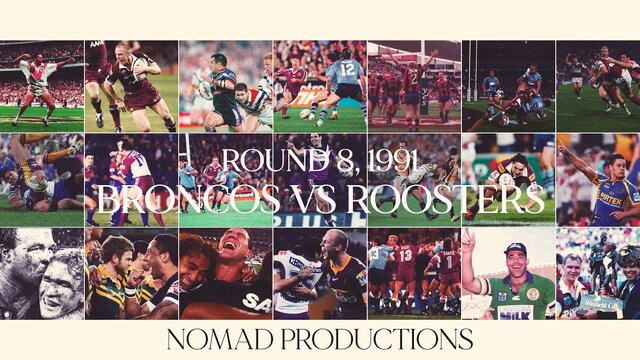gordjw
NRL Player
- Jun 29, 2013
- 1,754
- 824
http://www.abc.net.au/news/2017-09-...uld-be-its-own-pessimistic-self-hinds/8946500
Welcome to the NRL finals, a time for the boldest and best in the self-titled "greatest game of all" to shine.
A month of mouth-watering contests between the elite teams in a competition where the delicate balance between brutal power and precise skill means rugby league has entered a golden age.
It is a game enhanced over the past few decades by the wonderful Polynesian players whose muscular physiques and adventurous spirits have raised the standard of the NRL immeasurably.
You might not love rugby league. You might not even like it. But any unbiased observer will tell you that, within its rules and parameters, the game is closer than most sports to being the very best it can possibly be.
Accordingly, during four opening weekend NRL finals decided by a combined margin of just 17 points, we witnessed some brilliant, even breathtaking contests. Fast, furious and a touch controversial, as any tense cut-throat contests are likely to be.
So after catching our breath did we raise a glass and toast the triumphant winners, the gallant losers and the superb athletes of what Offsiders panellist Roy Masters likes to call "the great and glorious game of rugby league"?
Of course not!
This is the NRL. You could spray the whole competition with $100-a-drop perfume and it would still come out smelling like a shearing shed dunny.
So despite these wonderful games, the wider public — those the NRL has failed to convert or who have abandoned the game — could be forgiven for thinking the first weekend of finals were so strife-torn they made the Syrian crisis seems as confronting as a nine-year-old's birthday party.
There might be no sporting competition in the world where the gap between the excellent action on the field, and the bleak way the game is portrayed, is wider than in the NRL.
Why does such a great game enjoy such an appalling reputation? Put simply the NRL and the media is hating rugby league to death.
The NRL's long-term stagnation and recent decline in crowds in its Sydney heartland particularly, is the consequence of years of relentless negativity, self-indulgence and self-loathing.
This is inevitably reflected in the coverage of those in the media feeding from and, in some cases, deliberately inflaming every real and imagined "crisis".
The NRL has done itself few favours. Coaches mindlessly bashing referees to deflect heat from their teams' poor performances; players embroiled in drugs and sex scandals; selfish war lords using once proud clubs as personal playthings and a commission chairman who has failed to deliver on his mandate.
These are just some of the obvious reasons why the NRL's still vast audience is dwindling relative to its greatest rival, the AFL.
But to a significant degree, sections of the media have been complicit in — even responsible for — creating the perception the NRL is in eternal turmoil.
Not a game producing brilliant, breathtaking entertainment worth the price of admission despite the worst efforts of those who should be nurturing its growth.
This is not to suggest media organisations covering the NRL should be mindless cheerleaders. The brave exposure of the Cronulla Sharks' drugs scandal by a handful of News Corp journalists was just one excellent example of the close scrutiny a sometimes wild and unruly game needs.
But for all the NRL's faults, it is too often the victim of the relentless and self-serving negativity and sensationalism of those who work feverishly to inflame their often contrived "game in crisis" headlines.
Some coverage of the pathetic whining of Manly coach Trent Barrett and his Cronulla counterpart Shane Flanagan over some contentious refereeing decisions during last week's finals exemplified how the NRL's media coverage does it few favours.
The predictably agenda-driven sensationalists seized on the coaches' remarks to suggest there was a — yep — "crisis" in NRL refereeing. Never mind that many of the calls disputed by Barrett and Flanagan were either correct or borderline.
Feeding upon the prevailing narrative of NRL incompetence, even otherwise intelligent observers propagated the ludicrous notion coaches throwing sad little tantrums at press conferences were somehow "speaking for their fans" and performing some noble public service.
In the imagination of one particularly misguided scribe, NRL chief executive Todd Greenberg should run along like a good little boy and do the bidding of the petulant coaches whose incoherent rantings that can be forgiven as "heat of the moment" passion.
Even the broadcasters who pay big bucks to televise NRL games demean their own product with their rough treatment of the referees. Commentators and experts on Nine, particularly, are relentless in their quest to find fault with on-field and bunker decisions rather than explain them calmly and rationally to their viewers.
It's all about the drama, you see. "Rugby league thrives on controversy", those pedalling the eternal crisis stories will tell you.
The sentiment is both deluded and self-serving. Particularly when used as an excuse to conflate every player's personal misdemeanours into salacious "bad boys of league" stories and every administrative gaffe into an "NRL boss must go" headline.
Greenberg spoke for everyone who loves rugby league this week when he said "it's time for the game to grow up".
But so long as the self-interested, the enablers and the crisis-merchants retard the sport's progress a great game will appear to be just a silly little child.
Welcome to the NRL finals, a time for the boldest and best in the self-titled "greatest game of all" to shine.
A month of mouth-watering contests between the elite teams in a competition where the delicate balance between brutal power and precise skill means rugby league has entered a golden age.
It is a game enhanced over the past few decades by the wonderful Polynesian players whose muscular physiques and adventurous spirits have raised the standard of the NRL immeasurably.
You might not love rugby league. You might not even like it. But any unbiased observer will tell you that, within its rules and parameters, the game is closer than most sports to being the very best it can possibly be.
Accordingly, during four opening weekend NRL finals decided by a combined margin of just 17 points, we witnessed some brilliant, even breathtaking contests. Fast, furious and a touch controversial, as any tense cut-throat contests are likely to be.
So after catching our breath did we raise a glass and toast the triumphant winners, the gallant losers and the superb athletes of what Offsiders panellist Roy Masters likes to call "the great and glorious game of rugby league"?
Of course not!
This is the NRL. You could spray the whole competition with $100-a-drop perfume and it would still come out smelling like a shearing shed dunny.
So despite these wonderful games, the wider public — those the NRL has failed to convert or who have abandoned the game — could be forgiven for thinking the first weekend of finals were so strife-torn they made the Syrian crisis seems as confronting as a nine-year-old's birthday party.
There might be no sporting competition in the world where the gap between the excellent action on the field, and the bleak way the game is portrayed, is wider than in the NRL.
Why does such a great game enjoy such an appalling reputation? Put simply the NRL and the media is hating rugby league to death.
The NRL's long-term stagnation and recent decline in crowds in its Sydney heartland particularly, is the consequence of years of relentless negativity, self-indulgence and self-loathing.
This is inevitably reflected in the coverage of those in the media feeding from and, in some cases, deliberately inflaming every real and imagined "crisis".
The NRL has done itself few favours. Coaches mindlessly bashing referees to deflect heat from their teams' poor performances; players embroiled in drugs and sex scandals; selfish war lords using once proud clubs as personal playthings and a commission chairman who has failed to deliver on his mandate.
These are just some of the obvious reasons why the NRL's still vast audience is dwindling relative to its greatest rival, the AFL.
But to a significant degree, sections of the media have been complicit in — even responsible for — creating the perception the NRL is in eternal turmoil.
Not a game producing brilliant, breathtaking entertainment worth the price of admission despite the worst efforts of those who should be nurturing its growth.
This is not to suggest media organisations covering the NRL should be mindless cheerleaders. The brave exposure of the Cronulla Sharks' drugs scandal by a handful of News Corp journalists was just one excellent example of the close scrutiny a sometimes wild and unruly game needs.
But for all the NRL's faults, it is too often the victim of the relentless and self-serving negativity and sensationalism of those who work feverishly to inflame their often contrived "game in crisis" headlines.
Some coverage of the pathetic whining of Manly coach Trent Barrett and his Cronulla counterpart Shane Flanagan over some contentious refereeing decisions during last week's finals exemplified how the NRL's media coverage does it few favours.
The predictably agenda-driven sensationalists seized on the coaches' remarks to suggest there was a — yep — "crisis" in NRL refereeing. Never mind that many of the calls disputed by Barrett and Flanagan were either correct or borderline.
Feeding upon the prevailing narrative of NRL incompetence, even otherwise intelligent observers propagated the ludicrous notion coaches throwing sad little tantrums at press conferences were somehow "speaking for their fans" and performing some noble public service.
In the imagination of one particularly misguided scribe, NRL chief executive Todd Greenberg should run along like a good little boy and do the bidding of the petulant coaches whose incoherent rantings that can be forgiven as "heat of the moment" passion.
Even the broadcasters who pay big bucks to televise NRL games demean their own product with their rough treatment of the referees. Commentators and experts on Nine, particularly, are relentless in their quest to find fault with on-field and bunker decisions rather than explain them calmly and rationally to their viewers.
It's all about the drama, you see. "Rugby league thrives on controversy", those pedalling the eternal crisis stories will tell you.
The sentiment is both deluded and self-serving. Particularly when used as an excuse to conflate every player's personal misdemeanours into salacious "bad boys of league" stories and every administrative gaffe into an "NRL boss must go" headline.
Greenberg spoke for everyone who loves rugby league this week when he said "it's time for the game to grow up".
But so long as the self-interested, the enablers and the crisis-merchants retard the sport's progress a great game will appear to be just a silly little child.

